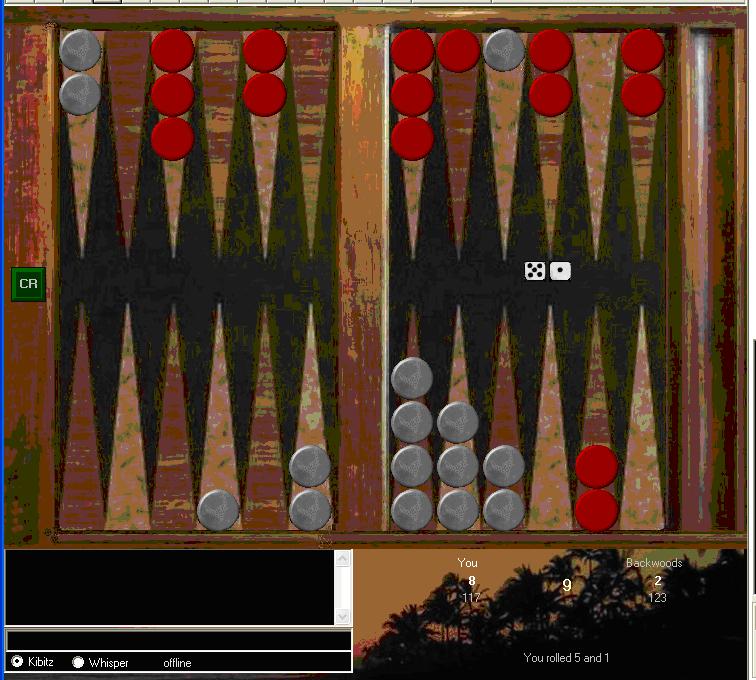News:
controversial "other online games" Board introduced --GO, Poker, Scrabble and gosh even Chess.....let me know 
Ads or Donors?




 (Rates: 1)
(Rates: 1)superb article BACKGAMMON: DECISION ANALYSIS FOR SUCCESS by Harvey Gillis reproduced here without permission from US Backgammon Federation Website for archival & educational purposes

Harvey Gillis (photo by Pat Gibson)
Harvey Gillis
© 2010 Harvey Gillis
The drama was unfolding. The choices were complex and I was sure that the result of making a mistake could be deadly. Attacking was risky; but so was doing nothing. A setback at this point could spell defeat for the entire campaign. The volatility of the situation made the decision even more difficult. Perhaps I could stall, buying myself some time or deferring a frontal assault by the enemy? Without a precise model, the choice was unclear; but I had to act. I would just have to rely upon strategic principles and my limited experience to make the decision.
A reader may think that I am describing the war room of a major military conflict, a final showdown of two business competitors, an incredibly important investment decision, the pursuit of a dangerous criminal, or even a medical team's handling of a malignant tumor. Not so. This was an ordinary encounter between two backgammon players! Backgammon is a seductive game that is easy to learn but enormously difficult to master — even after decades of study and practice. Stripped of prejudice, backgammon is a sophisticated decision theory application taking place within a stochastic (probabilistic) environment - not, in this respect, unlike life, war, business, forensics, or the stock market. Like these related analytical pursuits, it requires - and develops — strategy, oversight and sagacity.
For these reasons alone, backgammon should be taught in high school and college. It surpasses many other skill-based games in preparing young adults for the puzzles they will confront in their personal and professional lives when forced to make decisions under conditions of incomplete information and uncertainty. In addition it forms character, teaching the youthful mind how to deal with adversity and accident, taking those negatives in stride and even turning them to one's advantage.
Backgammon teaches a skill set that is essential to success for virtually anything that a person will encounter in their career, investments or personal life. It frames a methodology for selecting between precarious decisions. Its virtues are:
1) Backgammon teaches probabilistic decision making under stress.
2) It builds character, confidence and self-esteem.
3) It teaches the student how to deal with uncertainty and bad luck.
4) It rewards situational analysis and the building of alternative scenario outcomes.
5) It teaches the important lesson that strategy is more important than tactics, guesses, emotion or instinct.
6) It encourages the student to understand his adversaries.
7) It teaches you to distinguish between mortality and survivable morbidity.
8) It rewards "what if" analysis.
9) It rewards preparation. "The harder you work, the luckier you get."
10) Backgammon emphasizes the "war over the battle."
11) It teaches analytical concepts and probabilities.
12) Backgammon rewards flexibility
13) It teaches the rewards of taking calculated risks. "To take no risk is the greatest risk of all."
14) It is exciting. Like life, a backgammon game can take unpredictable twists and turns.
Given this impressive array of benefits, you should want your children introduced to backgammon at the earliest age possible. At minimum, we should all advocate the formation of backgammon clubs at high schools and universities, as Joe Russell, a past World Champion, has done at UCLA. And backgammon would be a great accredited course on decision analysis for business students. Working with Phil Simborg, head of the Backgammon Learning Center, Professor Don Berecz has followed this path at Georgia Southern University, introducing backgammon as an accredited course for all freshmen. Projects like these are just what the Education Committee of the U.S. Backgammon Federation is pursuing. I hope I have convinced you to support that effort in any way you can. Now, I have a backgammon match to play with a good friend. I am going to play for the most important reason: it's fun!

Today I want to present a very interesting position from the match Capablanca and Backwoods for the master series in the FIBS league which I lost after winning 8 / 2 to 9 in this position I played the very interesting 13/8 9/8 blocking the two red checkers, playing purity. But with the answer 42 revived, catching and blocking point 4: 8/4 * 6/4, white dances, then with 31 played 23/22 8/5, white dances again, 51 23/22 10/5, white dances again, 61 22/16 and then came back with the second tab, easily winning the game. With the simple capture and 21/20 * 9/4 the game and therefore the match is practically over. We must always kill the checkers in the adversary home not only to gain in the race but also to facilitate escape in case of difficulties. A single checker is a possibility of point inside the home. Sometimes we try to play purity when it is not necessary.








 Sited by SoulTrade
Sited by SoulTrade